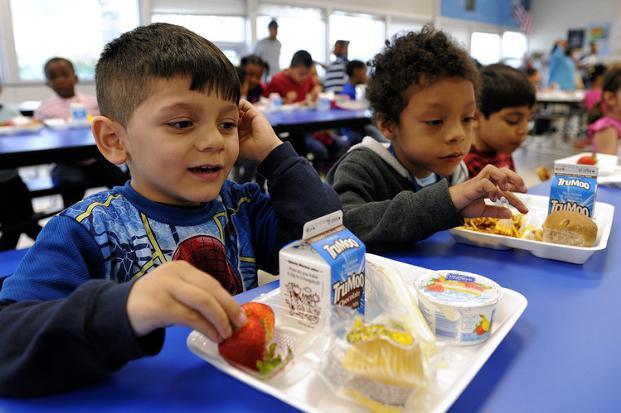Congress Looks at Reforming School Nutrition Program, but Will Latino Children Make the Cut?
Posted on 05/17/2016 @ 07:45 PM
 Photo Credit: Associated Press
Photo Credit: Associated Press
By: Ema de la Torre, LULAC National Policy and Legislation Intern
Many families depend on The National School Lunch Program (NSLP) and would agree that it is an essential component for nutrition in public schools. Eligible families apply for these services through an application process whereby they provide information regarding their household size and income. Children may also qualify to receive free or reduced-price lunch through direct certification in which schools utilize information from data from other public benefits such as the Supplemental Nutrition Assistance Program (SNAP). Generally, children living in households with incomes below the federal poverty level qualify for free or reduced-price school meals, but not all of these children are certified to receive these benefits. Due to various errors, many needy children are not getting the access they deserve.
High error rates in the certification process of eligible children for free or reduced-price school meals have raised concern among school districts, parents, lawmakers, and the civil rights community—not all of which are valid. Some critics of the program claim that many children were “overcertified” and received free or reduced-priced meals when they were ineligible. However, these opinions are misleading as the majority of the errors were misclassifications between free and reduced-priced meals, not due to large numbers of children taking advantage of the system. In addition, the majority of errors occurred from the application process and not through direct certification, which has been found to be the most accurate method of certification. The meal application process creates many opportunities for errors to occur due to language barriers and confusing questions for those filling out the application, such as inputting one’s net pay instead of gross pay.
Another cause for error rates occurs through the verification process, in which schools are required to audit approximately 3% of all meal applications. Parents are contacted by school administrators to provide proof of their reported income in order to verify their child’s eligibility for free or reduced-priced meals. However,
the verification processes has shown to cause eligible children to lose access to school meals because of parents’ failure to respond due to language barriers and working parents not having the time to provide the appropriate documentation to complete the verification process. On the other hand, parents that do respond to the audit may still see their child lose eligibility due to administrative errors. During the verification process, administrators may input data incorrectly into the system causing a child to no longer be eligible for free or reduced-priced meals.
Direct certification increases the accuracy of the school meal application process due to data reliability and reduction of paper applications school districts must review. Many districts have initiated Community Eligibility programs to reduce errors by eliminating the application and verification processes. Through this program, entire schools in low-income communities provide all meals at no charge to students. APEC study found that schools using community eligibility have lower improper payment rates.
Representative Todd Rokita recently introduced the Improving Child Nutrition and Education Act of 2016, on behalf of the House Education and Workforce Committee. Although the name suggests the legislation will improve child nutrition services, the bill includes numerous provisions of great concern. The shortcomings associated with this bill could be detrimental to low-income children, hindering them from accessing nutritious meals and potentially being kicked off the free or reduced lunch program. The bill also increases the percentage of applications that should be verified. In addition, the bill will prohibit community eligibility potentially leading to detrimental consequences for children such as losing their eligibility for free meals.
Help us ensure that Congress keeps Latino children on the school lunch program by contacting Members of Congress and urging them to oppose any bill that threatens to kick Latino children off the school lunch program.

Comments
Leave a Comment
You must be logged in to leave a comment.